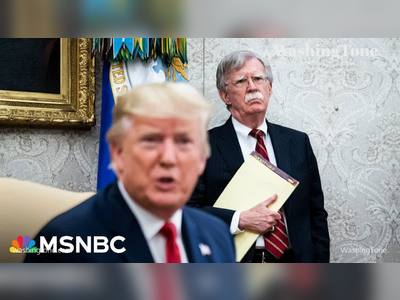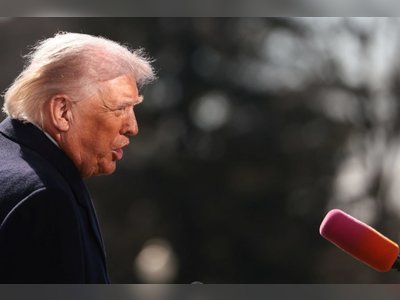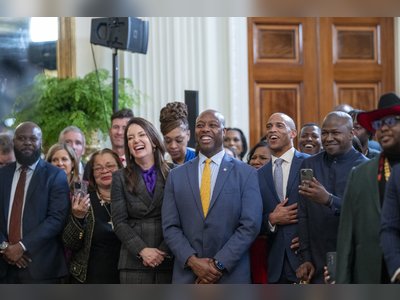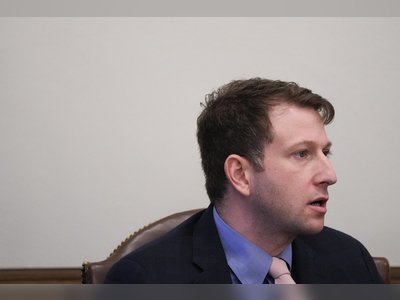White HouseSenateThe HouseSupreme CourtFederal ReserveDOJState DepartmentTreasuryCensusBudget OfficeTrade Representative
WashingTone
Informed by Washington, Defined by Insight
Monday, Mar 02, 2026
WashingTone

The United States’ Lasting Commitment to the Indo-Pacific Region
Investigating the U.S. policy change in the Indo-Pacific: Revitalizing alliances, enhancing security, and fostering regional stability.
The Indo-Pacific has become a central focus for U.S. foreign policy under the Biden-Harris Administration.
From the beginning of his presidency, President Joe Biden has deemed the region crucial not only for the future of the United States but also for global stability and prosperity.
Over the past four years, the U.S. has significantly ramped up its diplomatic, military, and economic involvement in the region, strengthening ties with allies and tackling growing challenges posed by global dynamics, such as tensions in the South China Sea and the rise of China's assertive geopolitical stance.
The U.S. Vision for a Free and Open Indo-Pacific
The Biden administration has committed to a vision of a free and open Indo-Pacific, where nations are sovereign in their choices, and the free movement of goods, services, and ideas is guaranteed.
A key aspect of this vision is upholding international laws and norms, especially maritime laws governing freedom of navigation.
The U.S. military continues to conduct operations in the region to ensure that critical sea lanes remain open and free from coercion.
In the past four years, the U.S. has contested several maritime claims in the South China Sea considered excessive and inconsistent with international law.
Beyond maritime security, the U.S. has collaborated with regional partners to strengthen democratic institutions, support free press initiatives, and counter foreign disinformation campaigns.
This includes partnerships with Japan, South Korea, and Australia to protect civil society and combat malign foreign influence.
Moreover, the U.S. has consistently advocated for human rights, focusing on regions like China, North Korea, and Burma, pressing for greater accountability in international forums.
Building a Stronger, More Connected Indo-Pacific
The U.S. recognizes that the Indo-Pacific's strength lies not only in military power but also in robust diplomatic, economic, and security relationships.
Under Biden, the U.S. has fortified bilateral partnerships with key regional actors like Japan, South Korea, Vietnam, and Indonesia, upgrading several relationships to Comprehensive Strategic Partnerships.
A major initiative in the region has been the Quad—a strategic partnership involving the U.S., India, Japan, and Australia.
Initially formed as a response to regional security challenges, the Quad has evolved into a platform for advancing projects in cybersecurity, maritime domain awareness, and critical infrastructure development.
Since 2021, Quad leaders have met multiple times, demonstrating unprecedented strategic alignment and supporting shared objectives.
Beyond the Quad, the U.S. has pursued deeper trilateral cooperation, notably between the U.S., Japan, and South Korea, focusing on regional security, shared military intelligence, and defense capabilities.
In August 2023, a breakthrough agreement marked a historic level of cooperation, strengthening the strategic bond among these three nations.
This alignment is crucial as they address issues like North Korea’s missile tests and China’s expanding military presence.
Expanding U.S. Diplomacy and Investment in the Indo-Pacific
The Biden administration’s approach to the Indo-Pacific extends beyond traditional military and security concerns.
In 2023, the U.S. hosted the Asia-Pacific Economic Cooperation (APEC) summit and announced over $50 billion in private sector investments to support sustainable growth regionwide.
In addition to enhancing economic ties, the U.S. has worked to build stronger infrastructure and energy partnerships.
Through initiatives like the Partnership for Global Infrastructure and Investment (PGI), the U.S. collaborates with countries like the Philippines and Japan to improve transportation, energy, and digital connectivity.
The U.S. has also emphasized resilient supply chains in the region, particularly in critical sectors like clean energy and technology.
The Indo-Pacific Economic Framework for Prosperity (IPEF), launched in 2022, aims to enhance trade, supply chain resilience, and economic cooperation with 13 partner countries.
The IPEF also focuses on promoting fair and transparent business practices and sustainable development.
Strengthening Security and Military Cooperation
The U.S. military presence in the Indo-Pacific remains a cornerstone of its strategy, serving as both a deterrent against aggression and a symbol of the U.S.'s commitment to regional security.
The recent agreement between the U.S., Australia, and the United Kingdom to support Australia’s acquisition of nuclear-powered submarines under the AUKUS security pact marks a significant development in this area.
This partnership aims to address emerging security challenges in the region, including those posed by China’s military expansion.
In addition to AUKUS, the U.S. has provided substantial foreign military financing (FMF) to bolster the defense capabilities of its regional partners.
This includes unprecedented FMF allocations for the Philippines, Vietnam, and the Papua New Guinea Defense Force.
The U.S. has also supported Taiwan’s self-defense capabilities in light of growing security concerns in the Taiwan Strait.
Addressing Climate Change and Environmental Challenges
The U.S. has made climate change central to its Indo-Pacific strategy, recognizing the region’s vulnerability to environmental disasters and the importance of collaborative solutions.
Through initiatives like the U.S.-ASEAN Climate Solutions Hub, the U.S. helps regional countries implement ambitious climate targets and enhance disaster resilience.
Additionally, the U.S. collaborates with Pacific Island countries to support sustainable infrastructure development and climate resilience improvements.
Promoting Regional Stability and Humanitarian Support
The U.S. has led responses to humanitarian crises, particularly in Burma and the Rohingya situation.
As a major contributor of humanitarian assistance, the U.S. has dedicated significant resources to support displaced populations and assist disaster relief efforts.
The U.S. has also used diplomatic channels to hold regimes accountable for human rights violations, particularly in Burma, North Korea, and China.
Through platforms like ASEAN and the Mekong-U.S. Partnership (MUSP), the U.S. has promoted regional cooperation on disaster relief, sustainable development, and tackling transnational threats like human trafficking and terrorism.
These partnerships are essential for addressing the region’s complex security and humanitarian challenges.
A Vision for the Future of the Indo-Pacific
As the U.S. continues its engagement in the Indo-Pacific, the administration remains dedicated to ensuring that the region is free, open, and prosperous.
However, the U.S. faces significant challenges, including managing its relationship with China, ensuring security in the South China Sea, and navigating tensions with North Korea.
The U.S. must also balance regional partnerships while addressing global priorities, such as climate change, economic resilience, and pandemic preparedness.
These efforts demonstrate a complex and multifaceted approach to the Indo-Pacific aiming to maintain a stable, secure, and prosperous environment for all stakeholders.
From the beginning of his presidency, President Joe Biden has deemed the region crucial not only for the future of the United States but also for global stability and prosperity.
Over the past four years, the U.S. has significantly ramped up its diplomatic, military, and economic involvement in the region, strengthening ties with allies and tackling growing challenges posed by global dynamics, such as tensions in the South China Sea and the rise of China's assertive geopolitical stance.
The U.S. Vision for a Free and Open Indo-Pacific
The Biden administration has committed to a vision of a free and open Indo-Pacific, where nations are sovereign in their choices, and the free movement of goods, services, and ideas is guaranteed.
A key aspect of this vision is upholding international laws and norms, especially maritime laws governing freedom of navigation.
The U.S. military continues to conduct operations in the region to ensure that critical sea lanes remain open and free from coercion.
In the past four years, the U.S. has contested several maritime claims in the South China Sea considered excessive and inconsistent with international law.
Beyond maritime security, the U.S. has collaborated with regional partners to strengthen democratic institutions, support free press initiatives, and counter foreign disinformation campaigns.
This includes partnerships with Japan, South Korea, and Australia to protect civil society and combat malign foreign influence.
Moreover, the U.S. has consistently advocated for human rights, focusing on regions like China, North Korea, and Burma, pressing for greater accountability in international forums.
Building a Stronger, More Connected Indo-Pacific
The U.S. recognizes that the Indo-Pacific's strength lies not only in military power but also in robust diplomatic, economic, and security relationships.
Under Biden, the U.S. has fortified bilateral partnerships with key regional actors like Japan, South Korea, Vietnam, and Indonesia, upgrading several relationships to Comprehensive Strategic Partnerships.
A major initiative in the region has been the Quad—a strategic partnership involving the U.S., India, Japan, and Australia.
Initially formed as a response to regional security challenges, the Quad has evolved into a platform for advancing projects in cybersecurity, maritime domain awareness, and critical infrastructure development.
Since 2021, Quad leaders have met multiple times, demonstrating unprecedented strategic alignment and supporting shared objectives.
Beyond the Quad, the U.S. has pursued deeper trilateral cooperation, notably between the U.S., Japan, and South Korea, focusing on regional security, shared military intelligence, and defense capabilities.
In August 2023, a breakthrough agreement marked a historic level of cooperation, strengthening the strategic bond among these three nations.
This alignment is crucial as they address issues like North Korea’s missile tests and China’s expanding military presence.
Expanding U.S. Diplomacy and Investment in the Indo-Pacific
The Biden administration’s approach to the Indo-Pacific extends beyond traditional military and security concerns.
In 2023, the U.S. hosted the Asia-Pacific Economic Cooperation (APEC) summit and announced over $50 billion in private sector investments to support sustainable growth regionwide.
In addition to enhancing economic ties, the U.S. has worked to build stronger infrastructure and energy partnerships.
Through initiatives like the Partnership for Global Infrastructure and Investment (PGI), the U.S. collaborates with countries like the Philippines and Japan to improve transportation, energy, and digital connectivity.
The U.S. has also emphasized resilient supply chains in the region, particularly in critical sectors like clean energy and technology.
The Indo-Pacific Economic Framework for Prosperity (IPEF), launched in 2022, aims to enhance trade, supply chain resilience, and economic cooperation with 13 partner countries.
The IPEF also focuses on promoting fair and transparent business practices and sustainable development.
Strengthening Security and Military Cooperation
The U.S. military presence in the Indo-Pacific remains a cornerstone of its strategy, serving as both a deterrent against aggression and a symbol of the U.S.'s commitment to regional security.
The recent agreement between the U.S., Australia, and the United Kingdom to support Australia’s acquisition of nuclear-powered submarines under the AUKUS security pact marks a significant development in this area.
This partnership aims to address emerging security challenges in the region, including those posed by China’s military expansion.
In addition to AUKUS, the U.S. has provided substantial foreign military financing (FMF) to bolster the defense capabilities of its regional partners.
This includes unprecedented FMF allocations for the Philippines, Vietnam, and the Papua New Guinea Defense Force.
The U.S. has also supported Taiwan’s self-defense capabilities in light of growing security concerns in the Taiwan Strait.
Addressing Climate Change and Environmental Challenges
The U.S. has made climate change central to its Indo-Pacific strategy, recognizing the region’s vulnerability to environmental disasters and the importance of collaborative solutions.
Through initiatives like the U.S.-ASEAN Climate Solutions Hub, the U.S. helps regional countries implement ambitious climate targets and enhance disaster resilience.
Additionally, the U.S. collaborates with Pacific Island countries to support sustainable infrastructure development and climate resilience improvements.
Promoting Regional Stability and Humanitarian Support
The U.S. has led responses to humanitarian crises, particularly in Burma and the Rohingya situation.
As a major contributor of humanitarian assistance, the U.S. has dedicated significant resources to support displaced populations and assist disaster relief efforts.
The U.S. has also used diplomatic channels to hold regimes accountable for human rights violations, particularly in Burma, North Korea, and China.
Through platforms like ASEAN and the Mekong-U.S. Partnership (MUSP), the U.S. has promoted regional cooperation on disaster relief, sustainable development, and tackling transnational threats like human trafficking and terrorism.
These partnerships are essential for addressing the region’s complex security and humanitarian challenges.
A Vision for the Future of the Indo-Pacific
As the U.S. continues its engagement in the Indo-Pacific, the administration remains dedicated to ensuring that the region is free, open, and prosperous.
However, the U.S. faces significant challenges, including managing its relationship with China, ensuring security in the South China Sea, and navigating tensions with North Korea.
The U.S. must also balance regional partnerships while addressing global priorities, such as climate change, economic resilience, and pandemic preparedness.
These efforts demonstrate a complex and multifaceted approach to the Indo-Pacific aiming to maintain a stable, secure, and prosperous environment for all stakeholders.











